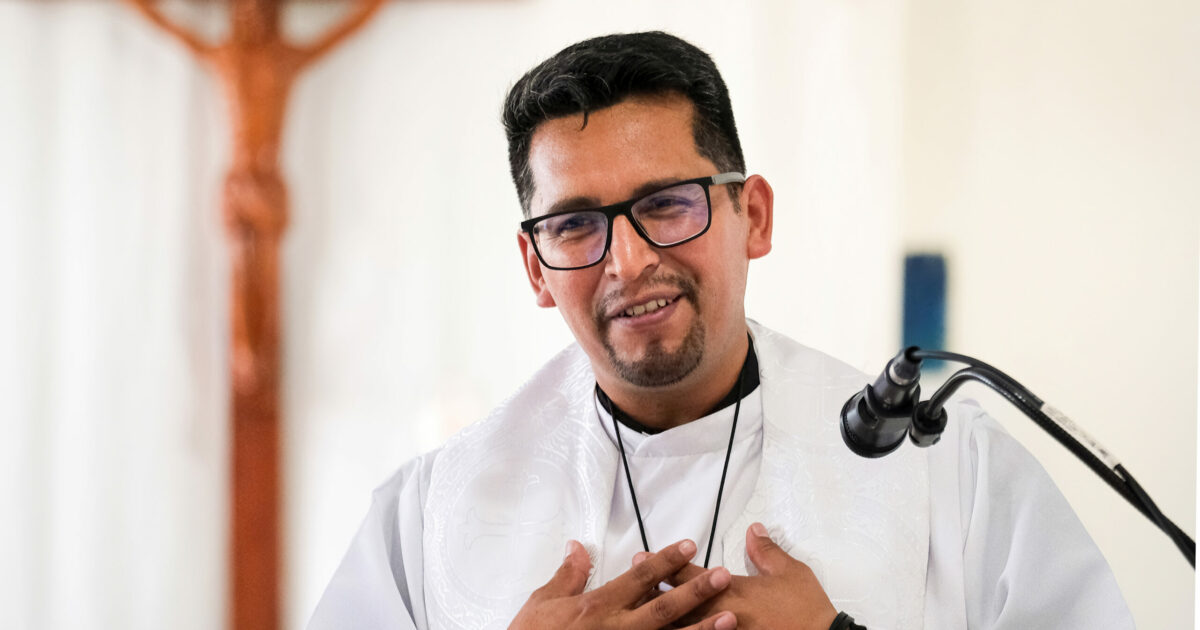
By Sarah Hjulberg
On May 24, a Divine Service celebrating the official recognition of altar and pulpit fellowship between The Lutheran Church—Missouri Synod (LCMS) and the Evangelical Christian Lutheran Church of Bolivia (ICEL) was held in the chapel of Concordia the Reformer Seminary in Palmar Arriba, Dominican Republic.
The service took place the day after the LCMS Latin America and the Caribbean (LAC) region’s annual symposium concluded. The timing enabled the participation of representatives from the LCMS; its partner church bodies in Latin America; and faculty, students and staff of Concordia the Reformer Seminary, along with their families.
This is the second time in Synod history that church fellowship has been celebrated with a Divine Service. (In 2022, a Divine Service celebrating fellowship with the Evangelical Lutheran Church of South Sudan/Sudan was held in Kisumu, Kenya.)
The Rev. Ted Krey, LAC regional director, conducted the Service of the Word in Spanish, and the Rev. Dr. Jonathan Shaw, director of LCMS Church Relations, conducted the Service of the Sacrament in English. ICEL President Rev. Limberth Fernández gave the sermon.
“Today is a special day for the church of Bolivia and The Lutheran Church—Missouri Synod,” preached Fernández. “And what has taken place is our Lord’s answer to these churches’ prayers for each other, that the Gospel would be preached purely among their members. For this reason, today is a day of joy, because the Lord has sown the truth in the hearts of these two churches from different countries.”
Full altar and pulpit fellowship — which means that LCMS pulpits are open to ICEL pastors (and vice versa), and that God’s people in the LCMS and the ICEL may commune with each other — is established after much prayer and many conversations to ensure unity in confession, in worship and in daily life. The Synod in convention formally recognizes partner churches every three years, but between conventions, the LCMS president, with the approval of the LCMS Commission on Theology and Church Relations (CTCR), may recognize fellowship with an emerging church body.
Formal conversations working toward church fellowship with the ICEL began in 2022 and concluded in February 2025, when the CTCR unanimously recommended the ICEL for church partnership. On May 4, just a few weeks before the celebratory Divine Service, the ICEL was officially recognized as an LCMS partner church.
Establishing church fellowship is a reason to celebrate.
“In heaven, there will be the one body of Christ, united in the marriage feast of the Lamb around the throne,” said Shaw. “In this world, the devil does so much to undercut that unity. So, when we can recognize that unity in Christ and His Word — wow, what a celebration. That’s incredible. It’s a foretaste of heaven.”
The LCMS currently has 43 official church partners around the world.
From Pietism to Lutheranism
Lutheranism came to Bolivia in the 1970s, when Norwegian Lutheran missionaries from the Pietist tradition began serving the Quechua-speaking people in rural Bolivia. These lay missionaries focused primarily on mercy work.
Because of its Pietist roots, for many years the Bolivian church did not heavily emphasize forming and ordaining pastors. But a meeting in 2000 between the ICEL, LCMS International Mission and the Evangelical Lutheran Church of Brazil (IELB) resulted in the ICEL’s shift toward confessional Lutheranism.
The ICEL began sending its pastors to the Evangelical Lutheran Church of Argentina’s seminary for training in 2010; then, in 2017, the ICEL began sending students to Concordia the Reformer Seminary. In 2020, the ICEL signed an official document formalizing its understanding of the Office of the Holy Ministry, and in 2022, it signed an agreement with Concordia the Reformer Seminary to send all of its men there for seminary.
Krey noted that most emerging church bodies, like the ICEL, don’t have seminaries. “Emerging churches that don’t have seminaries are sometimes like a boat without a rudder, but having a clear route to ordination, where there are faithful, God-fearing professors to teach [future pastors], can quickly move a church in the direction of being a faithful, proclaiming church that reaches people for Christ and brings the Good News to all,” said Krey.
One Bolivian student is currently studying to be a pastor at Concordia the Reformer, and another will begin next year.
‘United in Christ’
Prior to the May 24 Divine Service, the presidents of LCMS partner churches in Latin America gathered for a morning of presentations and discussions on church fellowship.
“The five hours of class and discussions are all oriented to help our sister church body presidents understand better the doctrine of fellowship: church bodies confessing the same thing, united in Christ and His work. That is important because there are a lot of false voices that say, ‘We can be diverse in our understanding of the Word,’” said Shaw.
The time spent reflecting on the doctrine of church fellowship and what it means to have unity in Christ was a poignant conclusion to a week of presentations on the history of mission work and partner church bodies in Latin America.
“In the symposium we covered the history of different churches, and how the Gospel came to each place, starting with Brazil, and then Argentina, Cuba, Mexico, Guatemala and Venezuela,” said the Rev. Sergio Fritzler, director of Concordia the Reformer Seminary.
A constant in each of these histories, Fritzler noted, was “the thankfulness for all those who have gone before us in the faith, that we now enjoy the Gospel among us.”
Posted June 25, 2025





Partnership discussions with the Lutheran Church in Bolivia, began in the late 1990s when I was regional Director for Atlanta America. I visited for the first time, representing the LCMS and made several follow up visits. I also participated in a visit with a nautical president to Bolivia. It is good to see that this fellowship has finally been declared, and it is the culmination of work that began almost 30 years ago. Amazing.
Awesome. Praise be to God.